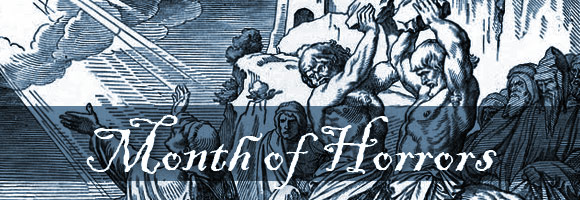WoGF Review: We Have Always Lived in the Castle by Shirley Jackson
 Clare Fitzgerald (thecynicalromantic) started reading feminist deconstructions of fairy tales in elementary school and grew up to major in literature and something called “discourse studies.” She reads a lot of teen fiction, gothic novels, and retold fairy tales, and is especially interested in feminist issues in fantasy and sci-fi. She reviews books at A Room of One’s Own because otherwise she is liable to forget what she’s read and what she thought about it. She currently works as a technical editor, but aspires to be a vampire witch queen pirate sorceress when she grows up.
Clare Fitzgerald (thecynicalromantic) started reading feminist deconstructions of fairy tales in elementary school and grew up to major in literature and something called “discourse studies.” She reads a lot of teen fiction, gothic novels, and retold fairy tales, and is especially interested in feminist issues in fantasy and sci-fi. She reviews books at A Room of One’s Own because otherwise she is liable to forget what she’s read and what she thought about it. She currently works as a technical editor, but aspires to be a vampire witch queen pirate sorceress when she grows up.
Editor’s Note: This review counts for October.
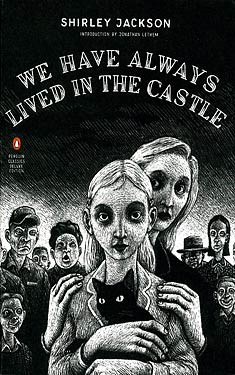 Much like everyone else who has gone through the American school system in the past few decades, I have read Shirley Jackson‘s famously creepy short story, The Lottery. I think The Lottery is one of those pieces that I had to read multiple times at different grade levels; however, I had never read anything else by Shirley Jackson, until now. In honor of it being Halloween, the latest book for my Classics book club was We Have Always Lived in the Castle, a short but exquisitely creepy novel about the last living members of a wealthy family, who live in a big house overlooking a small New England village.
Much like everyone else who has gone through the American school system in the past few decades, I have read Shirley Jackson‘s famously creepy short story, The Lottery. I think The Lottery is one of those pieces that I had to read multiple times at different grade levels; however, I had never read anything else by Shirley Jackson, until now. In honor of it being Halloween, the latest book for my Classics book club was We Have Always Lived in the Castle, a short but exquisitely creepy novel about the last living members of a wealthy family, who live in a big house overlooking a small New England village.
Our narratrix in this novel is Mary Katherine Blackwood, generally known as Merricat, who is eighteen years old. The other two remaining members of her family are her older sister Constance, and her Uncle Julian. Uncle Julian is very sickly, having survived the poisoning that killed the rest of the family six years earlier. We discover, eventually, that Constance and Merricat were the only family members not poisoned, Constance because the poison was in the sugar, which she never used, and Merricat because she had been sent to her room without dinner.
The Shirley Jackson Award
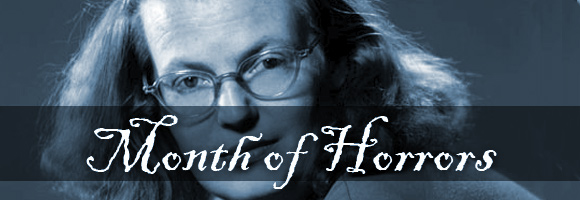
Just in time to kick of the Month of Horrors, we have added the Shirley Jackson Award to our awards list! We’re always on the lookout for ways to expand our book collection, and since Horror is the most recent genre addition to the site, our selection for it has been on the sparse side. Here’s how the Award runners describe themselves:
In recognition of the legacy of Shirley Jackson’s writing, and with permission of the author’s estate, the Shirley Jackson Awards have been established for outstanding achievement in the literature of psychological suspense, horror, and the dark fantastic.
Shirley Jackson (1916-1965) wrote such classic novels as The Haunting of Hill House and We Have Always Lived in the Castle, as well as one of the most famous short stories in the English language, “The Lottery.” Her work continues to be a major influence on writers of every kind of fiction, from the most traditional genre offerings to the most innovative literary work. National Book Critics Circle Award-winning novelist Jonathan Lethem has called Jackson “one of this century’s most luminous and strange American writers,” and multiple generations of authors would agree.
Go take a look at their site, and of course at our new award page.
Month of Horrors: In Praise of Unhappy Endings
Since this is my first post for Month of Horrors, I thought I might make it a comment on the worthiness of horror as a genre. I must confess that I have not read many of the books in the HWA Reading List, but I have long been a fan of Shirley Jackson’s short story, The Lottery. Initial reaction to the story was negative, sparking hundreds of angry letters and negative comments. One letter even came from her own mother, who declared: “this gloomy kind of story is all you young people think about these days.”
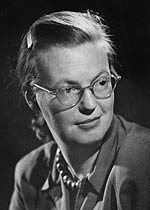 To give too many details of Jackson’s classic story would be redundant. It is a very short story as it is. Suffice it to say, it’s about an annual stoning that takes places in a rural town in the 20th century. It’s classic horror, gloom and all. Like many examples of the genre, The Lottery takes ancient custom (in this case, human sacrifice) and juxtaposes it with a modern setting. The anachronism forces the reader to look at the brutality of our own past by making it more immediate. I selected the Lottery, not because it was the first (Poe and Lovecraft beat her to it by a century), but because it was (and is) the cleanest, simplest example of horror as a genre. It paints an everyday, almost welcoming picture of hometown USA, then cuts your throat and leaves you for dead. No wonder she had so much hate mail that summer!
To give too many details of Jackson’s classic story would be redundant. It is a very short story as it is. Suffice it to say, it’s about an annual stoning that takes places in a rural town in the 20th century. It’s classic horror, gloom and all. Like many examples of the genre, The Lottery takes ancient custom (in this case, human sacrifice) and juxtaposes it with a modern setting. The anachronism forces the reader to look at the brutality of our own past by making it more immediate. I selected the Lottery, not because it was the first (Poe and Lovecraft beat her to it by a century), but because it was (and is) the cleanest, simplest example of horror as a genre. It paints an everyday, almost welcoming picture of hometown USA, then cuts your throat and leaves you for dead. No wonder she had so much hate mail that summer!
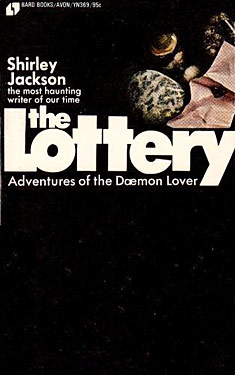 Look, I’m a sucker for a feel-good story, just like the next guy, but literature is at its best when it doesn’t give us what we want. Readers may yearn for happy endings, but we need unhappy ones. They are a call to action. Often, they are a challenge to stifling tradition. In Jackson’s world, “Although the villagers had forgotten the ritual and lost the original black box, they still remembered to use stones.” Their tradition is dead in all but practice, yet stubbornly, it remains. John Steinbeck once said “a writer who does not passionately believe in the perfectibility of man has no dedication nor any membership in literature.” Horror shows us the imperfect in man, and forces us to look. Without those terrifying glimpses in the mirror, we would never improve; never take that bold decision for change. This failure to change is, of course, at the heart of Jackson’s story:
Look, I’m a sucker for a feel-good story, just like the next guy, but literature is at its best when it doesn’t give us what we want. Readers may yearn for happy endings, but we need unhappy ones. They are a call to action. Often, they are a challenge to stifling tradition. In Jackson’s world, “Although the villagers had forgotten the ritual and lost the original black box, they still remembered to use stones.” Their tradition is dead in all but practice, yet stubbornly, it remains. John Steinbeck once said “a writer who does not passionately believe in the perfectibility of man has no dedication nor any membership in literature.” Horror shows us the imperfect in man, and forces us to look. Without those terrifying glimpses in the mirror, we would never improve; never take that bold decision for change. This failure to change is, of course, at the heart of Jackson’s story:
"They do say," Mr. Adams said to Old Man Warner, who stood next to him, "that over in the north village they’re talking of giving up the lottery."
Old Man Warner snorted, "Pack of crazy fools," he said. "Listening to the young folks, nothing’s good enough for them. Next thing you know, they’ll be wanting to go back to living in caves, nobody work any more, live that way for a while. Used to be a saying about ‘Lottery in June, corn be heavy soon.’ First thing you know, we’d all be eating stewed chickweed and acorns. There’s always been a lottery," he added petulantly. "Bad enough to see young Joe Summers up there joking with everybody."
"Some places have already quit lotteries," Mrs. Adams said.
"Nothing but trouble in that," Old Man Warner said stoutly. "Pack of young fools."
What Mr. Adams points out in disgust actually gives the reader some tenuous thread of hope: that the young will rise up and challenge the town’s barely remembered tradition. At its best, horror makes us all young, and challenges us to tear down the unexamined impulses that make us all guilty. The Lottery meets this standard and then some, more than justifying Shirley Jackson’s place in the WWEnd canon.



















 Full Details
Full Details
